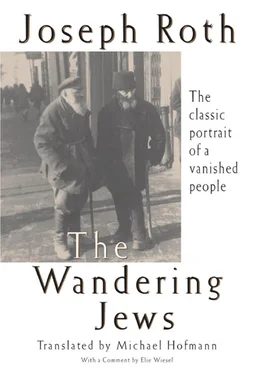The relationship between stage and audience was close, almost intimate. For Jews it is a fine thing to be an actor. The director came out and announced the next production. Personally — not in the press, not by posters. He said: “Next Wednesday, you will see Monsieur X. from America.” He spoke like a leader to his followers. He spoke plainly and wittily. They understood his jokes. Almost got them in advance. Sniffed the punch line.
4.
In France I was talking to a Jewish artiste from the old Russian-Austrian border town of Radziwillow.# He was a musical clown, and he was very successful. He was a clown by conviction, rather than by birth. He came from a family of musicians. His great-grandfather, grandfather, father, and brothers had all been Jewish wedding musicians. He was the only one who had been able to go and study in the West. A wealthy Jew supported him. He was accepted at a conservatory in Vienna. He began to compose his own music. He gave concerts. “But,” he said, “what business has a Jew got to be making serious music for the public? I’ve always been a clown in this world, even if they give lectures on me and a bespectacled newspaper critic sits in the front row. Should I play Beethoven? Should I play Kol Nidre ?** One evening, as I was standing up on stage, I burst out laughing. A musician from Radziwillow — whom was I trying to fool? Should I go back to Radziwillow and play at Jewish weddings? Or would I make myself even more ridiculous if I did that?
“That evening, it dawned on me that there was nothing else open to me except joining a circus, though not to be a bareback rider or an acrobat! That’s not for Jews. I’m a clown. And from my very first appearance in the circus, I’ve been utterly convinced that I haven’t broken with the tradition of my forefathers at all, but that what I am is what they should have been. Admittedly, seeing me would have come as a shock to them. I play the concertina and the harmonica and the saxophone, and I’m hugely relieved that people don’t know I can play Beethoven.
“I’m a Yid from Radziwillow.
“I like it in France. Maybe the world is the same all over for artistes, but not for me. In every city I look for Jews from Radziwillow. In every city I meet two or three. We get to talking. There are a few in Paris, too. And if they’re not from Radziwillow, they’re from Dubno. And if they’re not from Dubno, then they’re from Kishinev. And they’re doing well in Paris. They’re really doing well. Surely not all Jews can belong to the circus? But unless they’re with the circus, they have to suck up to all sorts of people they don’t know and don’t like. They can’t afford to be on bad terms with anyone. I just need to be a member of the Performers League. That’s a big plus. In Paris, Jews live at liberty. I’m a patriot; I have a Jewish heart.”
5.
Every year a few Jews from the East arrive in the great port city of Marseilles. They’ve come to board a ship. Or they’ve just disembarked. They were on their way somewhere else and ran out of money. They were forced ashore. They drag all their luggage to the post office, while they dictate a telegram and wait for a reply. But telegrams don’t always get answered promptly, least of all those that ask for money. Entire families sleep in the open.
A few, a very few, stay in Marseilles. They become interpreters. Interpreting is a Jewish calling. It has nothing to do with translating, say, from English into French, from Russian into French, from German into French. It has to do with translating the stranger, even if he hasn’t said anything. He doesn’t have to open his mouth. Christian interpreters might translate. Jewish ones intuit.
They earn money. They take strangers into good restaurants and out into the villages too. The interpreters take a cut of the profit. They earn money. They go down to the harbor, they get on a ship, and they go to South America. The United States is difficult for Jews to get into. The quotas were usually exceeded long ago.
6.
A few Eastern Jewish students go to Italy. The Italian government — which has something to atone for — awards scholarships to Jewish students.
Following the collapse of the Dual Monarchy, many Eastern Jews moved to the newly created South Slav Republic.††
Hungary evicts all Eastern Jews on principle. No Hungarian Jew will take them in. The majority of Hungarian Jews — in spite of Horthy‡‡—are Magyar nationalists. There are rabbis who are Hungarian nationalists.
7.
Where else is there for Eastern Jews to go?
They will not go to Spain. The rabbis placed a solemn curse on Spain when the Jews were forced to leave it. Even nonreligious, “enlightened” Jews are wary of going to Spain. The curse, it so happens, expires this year.
I heard from some Eastern Jewish students that they wanted to go to Spain. They will do well to leave the universities of Poland, where they impose quotas; the University of Vienna, where they impose quotas and bigotry; and the universities of Germany, where they impose the beer stein.
8.
It will take a few years yet. Then Eastern Jews will reach Spain. Old legends are told in the East, touching on the long history of the Jews in Spain. There sometimes appears to be a quiet yearning, a suppressed homesickness for this country, which evokes such powerful memories of the original homeland of Palestine.
That said, it’s hard to think of any stronger contrast than that between Eastern and Sephardic Jews. Sephardic Jews despise the Ashkenazim in general, and Eastern Jews in particular. The Sephardic Jews are proud of their noble old lineage. Intermarriage between Sephardic and Ashkenazic Jews is extremely rare; between Sephardic and Eastern Jews, almost unheard of.
9.
Once upon a time two Eastern Jews set out on their travels to collect money for the building of a synagogue. They crossed Germany on foot, reached the Rhine, crossed into France, and visited the old Jewish community there, in Montpellier. From there they went east, without a map, without knowing the roads, and got badly lost. One dark night, they found themselves in the perilous country of Spain, where they would certainly have been killed if some devout monks had not taken them in. The monks challenged the Jewish travelers to a theological dispute, were delighted with their erudition, and escorted them safely back across the border. They gave them a lump of gold toward the building of the synagogue. As they said goodbye, the Jews had to promise that they would use the gold for the construction.
The Jews duly promised. Custom (if not the letter of the law) forbade them to use the gold given them by a monastery — even such a friendly one — for their sacred building. For a long time they considered what to do, finally deciding to shape the lump of gold into a ball and fix it on the roof of the synagogue as a kind of emblem.
This golden ball still glitters on the roof of the synagogue. It is the only thing that still connects the Eastern Jews with their erstwhile homeland in Spain.
I heard this story from an old Jew. He was a Torah scribe by profession, a zophar , a poor, wise, and deeply religious man. He was opposed to the Zionists.
“Now,” he said, “the cherem —the anathema, or curse— on Spain will lapse. I have no objection to my grandchildren going to Spain. Jews did not always fare badly there. There were religious people in Spain, and wherever there are devout Christians is a place where Jews can live as well. Because the fear of God is still more dependable than so-called modern humanism.”
He didn’t know, the old fellow, that humanism is no longer modern. What did he know? he was just a poor Torah scribe.
*During the great Inflation of 1923, money lost so much in value that it was carted around in wheelbarrows and used for papering walls.
Читать дальше












